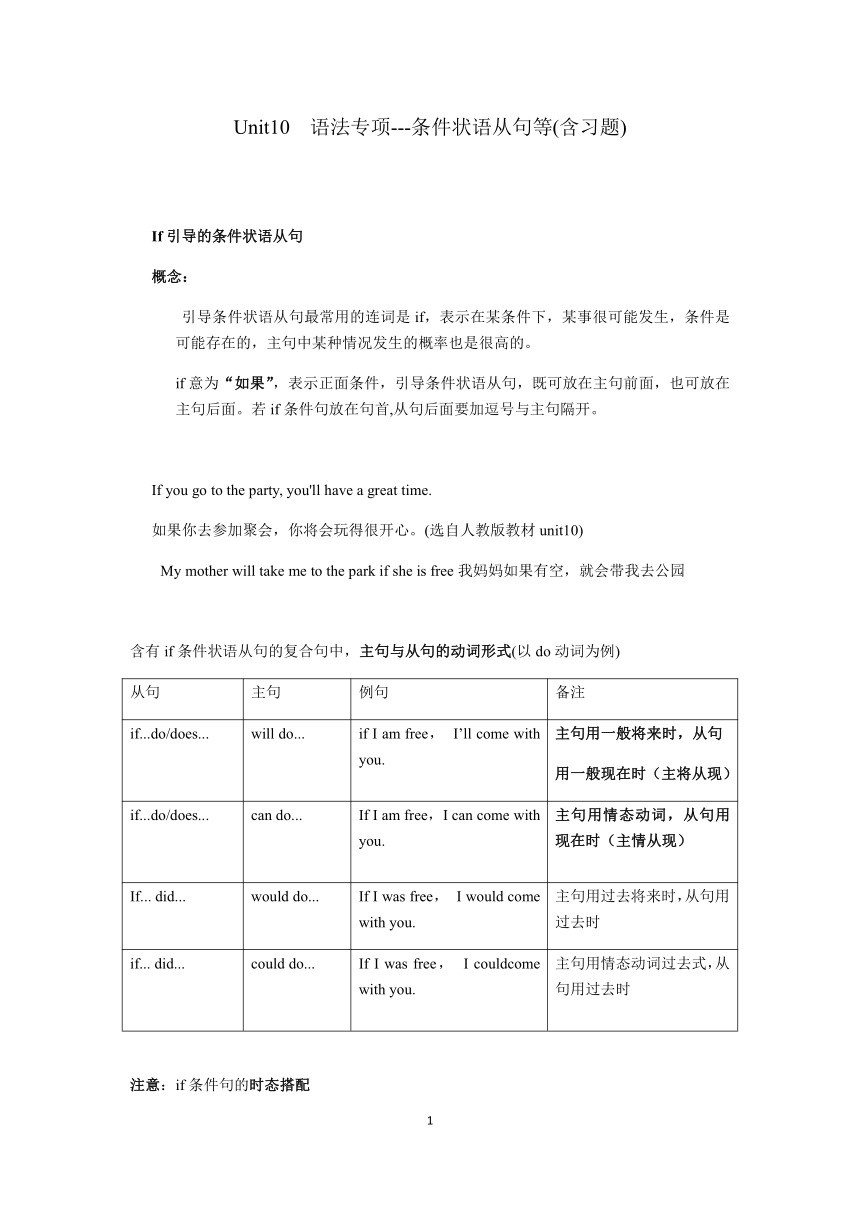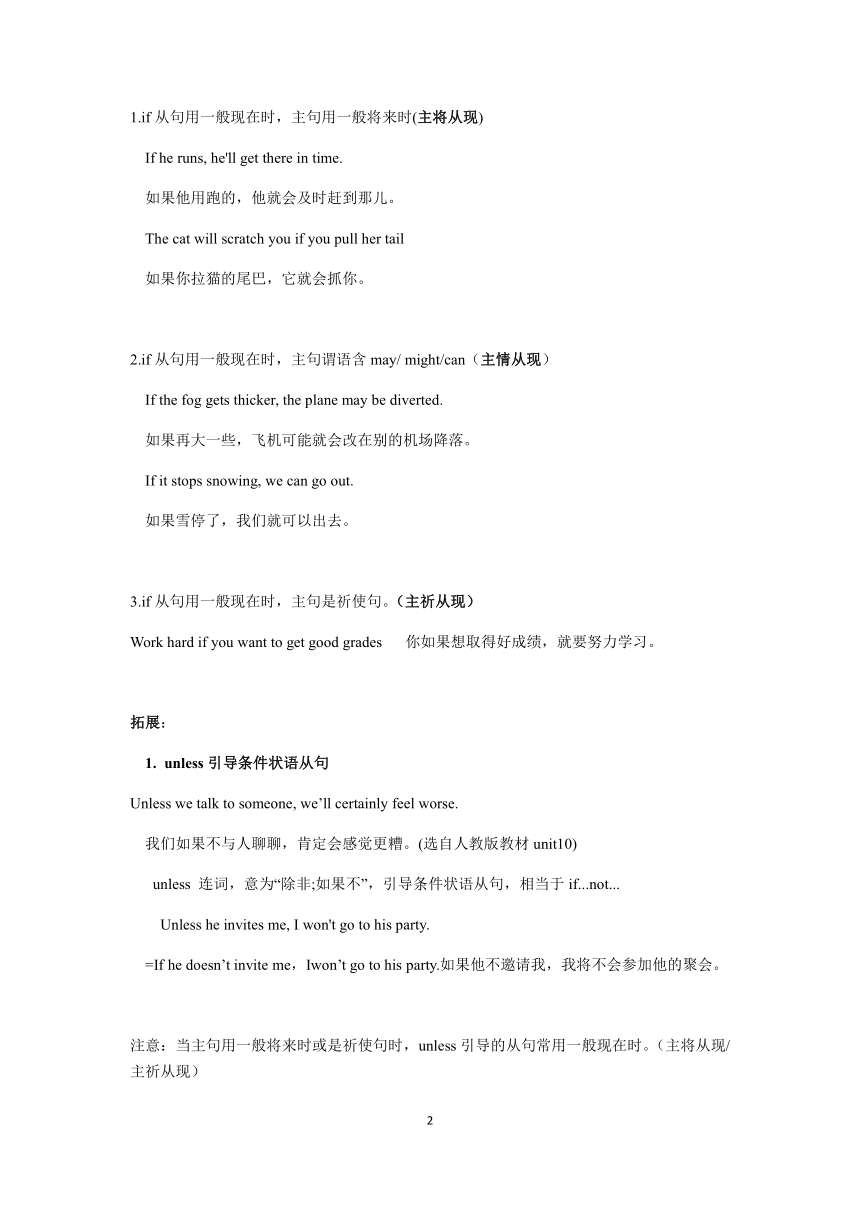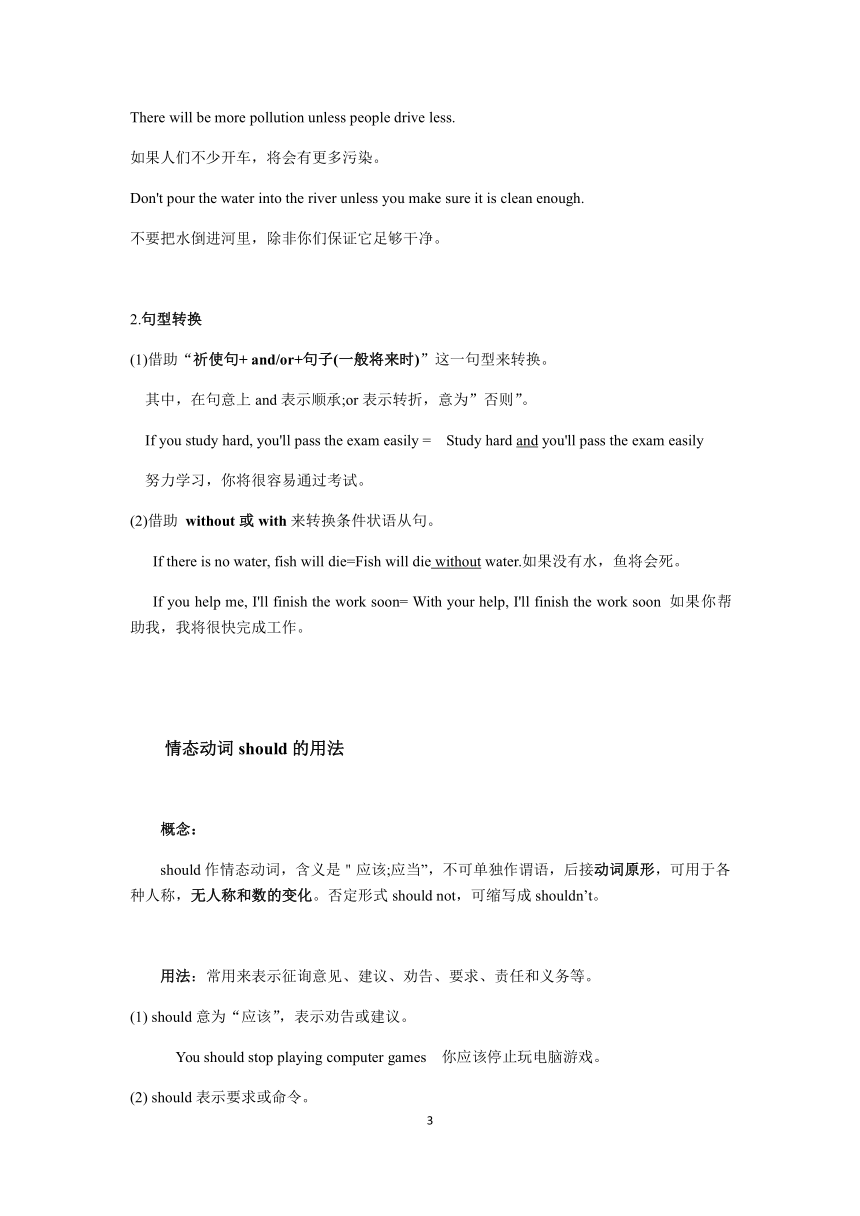2020年暑假预习:初中英语8年级上册unit10 语法专项---条件状语从句等(含习题) 含答案
文档属性
| 名称 | 2020年暑假预习:初中英语8年级上册unit10 语法专项---条件状语从句等(含习题) 含答案 |  | |
| 格式 | zip | ||
| 文件大小 | 22.7KB | ||
| 资源类型 | 教案 | ||
| 版本资源 | 人教新目标(Go for it)版 | ||
| 科目 | 英语 | ||
| 更新时间 | 2020-08-05 18:14:59 | ||
图片预览



文档简介
Unit10
语法专项---条件状语从句等(含习题)
If引导的条件状语从句
概念:
引导条件状语从句最常用的连词是if,表示在某条件下,某事很可能发生,条件是可能存在的,主句中某种情况发生的概率也是很高的。
if意为“如果”,表示正面条件,引导条件状语从句,既可放在主句前面,也可放在主句后面。若if条件句放在句首,从句后面要加逗号与主句隔开。
If
you
go
to
the
party,
you'll
have
a
great
time.
如果你去参加聚会,你将会玩得很开心。(选自人教版教材unit10)
My
mother
will
take
me
to
the
park
if
she
is
free我妈妈如果有空,就会带我去公园
含有if条件状语从句的复合句中,主句与从句的动词形式(以do动词为例)
从句
主句
例句
备注
if...do/does...
will
do...
if
I
am
free,
I’ll
come
with
you.
主句用一般将来时,从句
用一般现在时(主将从现)
if...do/does...
can
do...
If
I
am
free,I
can
come
with
you.
主句用情态动词,从句用现在时(主情从现)
If...
did...
would
do...
If
I
was
free,
I
would
come
with
you.
主句用过去将来时,从句用过去时
if...
did...
could
do...
If
I
was
free,
I
couldcome
with
you.
主句用情态动词过去式,从句用过去时
注意:if条件句的时态搭配
1.if从句用一般现在时,主句用一般将来时
(主将从现)
If
he
runs,
he'll
get
there
in
time.
如果他用跑的,他就会及时赶到那儿。
The
cat
will
scratch
you
if
you
pull
her
tail
如果你拉猫的尾巴,它就会抓你。
2.if从句用一般现在时,主句谓语含may/
might/can(主情从现)
If
the
fog
gets
thicker,
the
plane
may
be
diverted.
如果再大一些,飞机可能就会改在别的机场降落。
If
it
stops
snowing,
we
can
go
out.
如果雪停了,我们就可以出去。
3.if从句用一般现在时,主句是祈使句。(主祈从现)
Work
hard
if
you
want
to
get
good
grades
你如果想取得好成绩,就要努力学习。
拓展:
unless引导条件状语从句
Unless
we
talk
to
someone,
we’ll
certainly
feel
worse.
我们如果不与人聊聊,肯定会感觉更糟。(选自人教版教材unit10)
unless
连词,意为“除非;如果不”,引导条件状语从句,相当于if...not...
Unless
he
invites
me,
I
won't
go
to
his
party.
=If
he
doesn’t
invite
me,Iwon’t
go
to
his
party.如果他不邀请我,我将不会参加他的聚会。
注意:当主句用一般将来时或是祈使句时,unless引导的从句常用一般现在时。(主将从现/主祈从现)
There
will
be
more
pollution
unless
people
drive
less.
如果人们不少开车,将会有更多污染。
Don't
pour
the
water
into
the
river
unless
you
make
sure
it
is
clean
enough.
不要把水倒进河里,除非你们保证它足够干净。
2.句型转换
(1)借助“祈使句+
and/or+句子(一般将来时)”这一句型来转换。
其中,在句意上and表示顺承;or表示转折,意为”否则”。
If
you
study
hard,
you'll
pass
the
exam
easily
=
Study
hard
and
you'll
pass
the
exam
easily
努力学习,你将很容易通过考试。
(2)借助
without或with来转换条件状语从句。
If
there
is
no
water,
fish
will
die=Fish
will
die
without
water.如果没有水,鱼将会死。
If
you
help
me,
I'll
finish
the
work
soon=
With
your
help,
I'll
finish
the
work
soon
如果你帮助我,我将很快完成工作。
情态动词should的用法
概念:
should作情态动词,含义是"应该;应当”,不可单独作谓语,后接动词原形,可用于各种人称,无人称和数的变化。否定形式should
not,可缩写成shouldn’t。
用法:常用来表示征询意见、建议、劝告、要求、责任和义务等。
(1)
should意为“应该”,表示劝告或建议。
You
should
stop
playing
computer
games
你应该停止玩电脑游戏。
(2)
should表示要求或命令。
You
shouldn’t
fight
with
your
classmate
你不应该和同学打架。
(3)
should表示预测或可能。(=probably)
His
schoolbag
should
be
in
the
classroom.他的书包可能在教室里。
(4)
should有时表示说话人的感情,如惊讶、愤怒、失望等。
Why
should
I
go?为什么是我去?
(5)表示“竟然”。
It's
strange
that
he
should
be
late.真奇怪,他竟然会迟到。
(6)用在第一人称疑问句中,表示征求对方意见。
Should
I
help
you
with
the
dinner?要不要我帮你做晚饭?
不同句式:
肯定句
主语
+should+动词原形+其他
You
should
listen
to
your
parents.你应该听你父母的话。
否定句
主语
+should
not/shouldn’t+动词原形+其他
You
shouldn't
go
out
last
night.昨晚你不应该出去。
一般疑问句
Should+主语+动词原形+其他
Should
I
take
my
temperature
first?我应该先量体温吗?
特殊疑问句
What
should+主语+动词原形?
(以what为例)
What
do
you
think
I
should
do?你认为我该做些什么?
动词不定式用法
不定式可以和疑问代词who,what,
which及疑问副词when,how,where连用构成不定式短语,在句中担当主语、宾语、表语等成分。
作表语
The
question
is
when
to
start.问题是什么时候开始。
作主语
What
to
do
is
an
important
problem.该做什么是一个很重要的问题。
作宾语
I
can’t
decide
who/
whom
to
invite.我决定不了邀请谁。
“疑问词+不定式”作宾语时,常与下列动词连用:know,show,teach,
tell,
find
out,
learn,
forget等。
We
don’t
know
when
to
go.我们不知道什么时候去。
拓展:“疑问词+动词不定式”的常见考点
①“疑问词+动词不定式”的同义转换,可以转化为对应的宾语从句。
I
don’t
know
what
I
should
do
next.
=
I
don’t
know
what
to
do
next.我不知道接下来做什么。
We
want
to
know
how
to
use
the
new
machine.
=We
want
to
know
how
we
can
use
the
new
machine.
我们想知道如何使用这台新机器。
②动词后面是否加介词。
I
didn't
decide
which
room
to
live
in.我没有决定住哪个房间。
I
didn’t
decide
where
to
live.我没有决定住在哪儿。
③动词后面是否需要宾语。
I
don’t
know
what
to
do.我不知道做什么。
I
don’t
know
how
to
do
it.我不知道怎样做它。
注意:what作do的宾语,所以不能再加it;
how是连接副词,作状语,所以需要让it作do的宾语。
练习题:
1.
Kim
has
a
stomachache,so
he______
eat
anything.
A
shouldn't
B
should
C
can
D
want
2.Why
not
look
up
the
new
word
in
a
dictionary_____you
don't
know
it?
A
if
B
that
C
though
D
whether
3.We
will
have
a
sports
meeting
if
it
__________rain
tomorrow.
A
won’t
B
isn't
C
don't
D
doesn't
4.Lucy
is
wondering
where________________(spend)her
summer
holiday.
5.At
that
time
I
didn’t
know
what____________(do)next.
6.I
learnt
how____________(ride)a
bike
when
I
was
six
years
old.
7.He
doesn’t
know_________to
say
at
the
moment.
A
when
B
what
C
why
D
where
8.Should
I
take
some
medicine?(作肯定回答)
Yes,____________.
9.You_______help
your
parents
do
some
housework,
they
are
tired.
A
needn't
B
should
C
can’t
D
would
10.If
she_____,
she'll
have
a
great
time.
A
do
B
will
do
C
does
D
did
11.---Will
your
friend
go
to
the
party
with
you?
---If
your
friend_______,
my
friend_________,too.
A
does;
will
go
B
will;
will
go
C
does;
goes
D
will,
goes
12._______he
works
hard
on
it,
he
will
do
it
better.
A
If
B
Though
C
But
13.The
girl
doesn't
know
how
____________(look)after
her
little
sister
14.Please
___________this
book.
It
will
tell
you
how_________nice
food.
A
read;to
cook
B
read.
cook
C
reading,to
cook
D
reading,
cook
15.---I'll
have
a
ten-day
holiday.
But
I
don't
know_______.
---How
about
Paris?
A.
what
to
do
B
where
to
go
C
when
to
go
16.---The
novel
seems
a
little
boring.
---You
won’t
enjoy
it_______you
put
your
heart
into
it.
A.
when
B.
if
C.
after
D.
unless
答案:
1-3
AAD
4.to
spend
5.to
do
6.to
ride
7.B
8.you
should
9-12
BCAA
13.to
look
14.A
15.B
16.D
语法专项---条件状语从句等(含习题)
If引导的条件状语从句
概念:
引导条件状语从句最常用的连词是if,表示在某条件下,某事很可能发生,条件是可能存在的,主句中某种情况发生的概率也是很高的。
if意为“如果”,表示正面条件,引导条件状语从句,既可放在主句前面,也可放在主句后面。若if条件句放在句首,从句后面要加逗号与主句隔开。
If
you
go
to
the
party,
you'll
have
a
great
time.
如果你去参加聚会,你将会玩得很开心。(选自人教版教材unit10)
My
mother
will
take
me
to
the
park
if
she
is
free我妈妈如果有空,就会带我去公园
含有if条件状语从句的复合句中,主句与从句的动词形式(以do动词为例)
从句
主句
例句
备注
if...do/does...
will
do...
if
I
am
free,
I’ll
come
with
you.
主句用一般将来时,从句
用一般现在时(主将从现)
if...do/does...
can
do...
If
I
am
free,I
can
come
with
you.
主句用情态动词,从句用现在时(主情从现)
If...
did...
would
do...
If
I
was
free,
I
would
come
with
you.
主句用过去将来时,从句用过去时
if...
did...
could
do...
If
I
was
free,
I
couldcome
with
you.
主句用情态动词过去式,从句用过去时
注意:if条件句的时态搭配
1.if从句用一般现在时,主句用一般将来时
(主将从现)
If
he
runs,
he'll
get
there
in
time.
如果他用跑的,他就会及时赶到那儿。
The
cat
will
scratch
you
if
you
pull
her
tail
如果你拉猫的尾巴,它就会抓你。
2.if从句用一般现在时,主句谓语含may/
might/can(主情从现)
If
the
fog
gets
thicker,
the
plane
may
be
diverted.
如果再大一些,飞机可能就会改在别的机场降落。
If
it
stops
snowing,
we
can
go
out.
如果雪停了,我们就可以出去。
3.if从句用一般现在时,主句是祈使句。(主祈从现)
Work
hard
if
you
want
to
get
good
grades
你如果想取得好成绩,就要努力学习。
拓展:
unless引导条件状语从句
Unless
we
talk
to
someone,
we’ll
certainly
feel
worse.
我们如果不与人聊聊,肯定会感觉更糟。(选自人教版教材unit10)
unless
连词,意为“除非;如果不”,引导条件状语从句,相当于if...not...
Unless
he
invites
me,
I
won't
go
to
his
party.
=If
he
doesn’t
invite
me,Iwon’t
go
to
his
party.如果他不邀请我,我将不会参加他的聚会。
注意:当主句用一般将来时或是祈使句时,unless引导的从句常用一般现在时。(主将从现/主祈从现)
There
will
be
more
pollution
unless
people
drive
less.
如果人们不少开车,将会有更多污染。
Don't
pour
the
water
into
the
river
unless
you
make
sure
it
is
clean
enough.
不要把水倒进河里,除非你们保证它足够干净。
2.句型转换
(1)借助“祈使句+
and/or+句子(一般将来时)”这一句型来转换。
其中,在句意上and表示顺承;or表示转折,意为”否则”。
If
you
study
hard,
you'll
pass
the
exam
easily
=
Study
hard
and
you'll
pass
the
exam
easily
努力学习,你将很容易通过考试。
(2)借助
without或with来转换条件状语从句。
If
there
is
no
water,
fish
will
die=Fish
will
die
without
water.如果没有水,鱼将会死。
If
you
help
me,
I'll
finish
the
work
soon=
With
your
help,
I'll
finish
the
work
soon
如果你帮助我,我将很快完成工作。
情态动词should的用法
概念:
should作情态动词,含义是"应该;应当”,不可单独作谓语,后接动词原形,可用于各种人称,无人称和数的变化。否定形式should
not,可缩写成shouldn’t。
用法:常用来表示征询意见、建议、劝告、要求、责任和义务等。
(1)
should意为“应该”,表示劝告或建议。
You
should
stop
playing
computer
games
你应该停止玩电脑游戏。
(2)
should表示要求或命令。
You
shouldn’t
fight
with
your
classmate
你不应该和同学打架。
(3)
should表示预测或可能。(=probably)
His
schoolbag
should
be
in
the
classroom.他的书包可能在教室里。
(4)
should有时表示说话人的感情,如惊讶、愤怒、失望等。
Why
should
I
go?为什么是我去?
(5)表示“竟然”。
It's
strange
that
he
should
be
late.真奇怪,他竟然会迟到。
(6)用在第一人称疑问句中,表示征求对方意见。
Should
I
help
you
with
the
dinner?要不要我帮你做晚饭?
不同句式:
肯定句
主语
+should+动词原形+其他
You
should
listen
to
your
parents.你应该听你父母的话。
否定句
主语
+should
not/shouldn’t+动词原形+其他
You
shouldn't
go
out
last
night.昨晚你不应该出去。
一般疑问句
Should+主语+动词原形+其他
Should
I
take
my
temperature
first?我应该先量体温吗?
特殊疑问句
What
should+主语+动词原形?
(以what为例)
What
do
you
think
I
should
do?你认为我该做些什么?
动词不定式用法
不定式可以和疑问代词who,what,
which及疑问副词when,how,where连用构成不定式短语,在句中担当主语、宾语、表语等成分。
作表语
The
question
is
when
to
start.问题是什么时候开始。
作主语
What
to
do
is
an
important
problem.该做什么是一个很重要的问题。
作宾语
I
can’t
decide
who/
whom
to
invite.我决定不了邀请谁。
“疑问词+不定式”作宾语时,常与下列动词连用:know,show,teach,
tell,
find
out,
learn,
forget等。
We
don’t
know
when
to
go.我们不知道什么时候去。
拓展:“疑问词+动词不定式”的常见考点
①“疑问词+动词不定式”的同义转换,可以转化为对应的宾语从句。
I
don’t
know
what
I
should
do
next.
=
I
don’t
know
what
to
do
next.我不知道接下来做什么。
We
want
to
know
how
to
use
the
new
machine.
=We
want
to
know
how
we
can
use
the
new
machine.
我们想知道如何使用这台新机器。
②动词后面是否加介词。
I
didn't
decide
which
room
to
live
in.我没有决定住哪个房间。
I
didn’t
decide
where
to
live.我没有决定住在哪儿。
③动词后面是否需要宾语。
I
don’t
know
what
to
do.我不知道做什么。
I
don’t
know
how
to
do
it.我不知道怎样做它。
注意:what作do的宾语,所以不能再加it;
how是连接副词,作状语,所以需要让it作do的宾语。
练习题:
1.
Kim
has
a
stomachache,so
he______
eat
anything.
A
shouldn't
B
should
C
can
D
want
2.Why
not
look
up
the
new
word
in
a
dictionary_____you
don't
know
it?
A
if
B
that
C
though
D
whether
3.We
will
have
a
sports
meeting
if
it
__________rain
tomorrow.
A
won’t
B
isn't
C
don't
D
doesn't
4.Lucy
is
wondering
where________________(spend)her
summer
holiday.
5.At
that
time
I
didn’t
know
what____________(do)next.
6.I
learnt
how____________(ride)a
bike
when
I
was
six
years
old.
7.He
doesn’t
know_________to
say
at
the
moment.
A
when
B
what
C
why
D
where
8.Should
I
take
some
medicine?(作肯定回答)
Yes,____________.
9.You_______help
your
parents
do
some
housework,
they
are
tired.
A
needn't
B
should
C
can’t
D
would
10.If
she_____,
she'll
have
a
great
time.
A
do
B
will
do
C
does
D
did
11.---Will
your
friend
go
to
the
party
with
you?
---If
your
friend_______,
my
friend_________,too.
A
does;
will
go
B
will;
will
go
C
does;
goes
D
will,
goes
12._______he
works
hard
on
it,
he
will
do
it
better.
A
If
B
Though
C
But
13.The
girl
doesn't
know
how
____________(look)after
her
little
sister
14.Please
___________this
book.
It
will
tell
you
how_________nice
food.
A
read;to
cook
B
read.
cook
C
reading,to
cook
D
reading,
cook
15.---I'll
have
a
ten-day
holiday.
But
I
don't
know_______.
---How
about
Paris?
A.
what
to
do
B
where
to
go
C
when
to
go
16.---The
novel
seems
a
little
boring.
---You
won’t
enjoy
it_______you
put
your
heart
into
it.
A.
when
B.
if
C.
after
D.
unless
答案:
1-3
AAD
4.to
spend
5.to
do
6.to
ride
7.B
8.you
should
9-12
BCAA
13.to
look
14.A
15.B
16.D
同课章节目录
- Unit 1 Where did you go on vacation?
- Section A
- Section B
- Unit 2 How often do you exercise?
- Section A
- Section B
- Unit 3 I'm more outgoing than my sister.
- Section A
- Section B
- Unit 4 What's the best movie theater?
- Section A
- Section B
- Unit 5 Do you want to watch a game show?
- Section A
- Section B
- Unit 6 I'm going to study computer science.
- Section A
- Section B
- Unit 7 Will people have robots?
- Section A
- Section B
- Unit 8 How do you make a banana milk shake?
- Section A
- Section B
- Unit 9 Can you come to my party?
- Section A
- Section B
- Unit 10 If you go to the party, you'll have a grea
- Section A
- Section B
